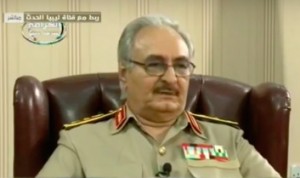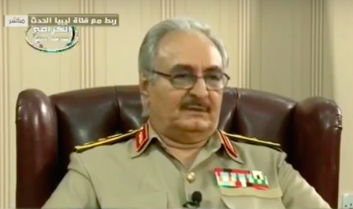By Libya Herald reporters.

Tunis, 18 May 2016:
Khalifa Hafter, appointed by the House of Representatives as commander-in-chief of the armed forces has . . .[restrict]thrown down a gauntlet to the international community just 48 hours after 21 states supported the Government of National Accord at the Libya summit in Vienna.
“The decisions of the Accord Government are just ink on paper. I don’t care about them” he told Libya TV in an hour long interview conducted in his office at his Marj headquarters. This was so, he said, because the government had not yet been recognised by a vote from the House of Representatives.
Hafter also rejected the Presidency Council’s establishment of a Presidential Guard. In Vienna on Monday it was agreed that the UN Security Council should be asked for a partial lifting on the 2011 arms embargo to arm and equip this force.
Though relatively un-animated throughout the interview, Hafter was derisive of what he described as the UN-imposed Government of National Accord. He said he did not have time to waste with UNSMIL chief Martin Kobler. Last week Hafter rejected a meeting proposed by Kobler. “ I rely on the army and the police and not on a UN official” he said.
Hafter, who has in the past denied that he had any political ambitions, rejected accusations that he was seeking power. “Dictatorship will not return to Libya”. He argued that the army, which had been hit badly during the NATO intervention, was along with the police, the guarantor of Libyan stability. “ We want Libya to be a civilian state. Dictatorship will not return to Libya,” he said, “ We want the army to return to its former standing”. He said that he believed that Libyans wanted democracy and so did he, adding that he had lived 25 years in the West.
But he continued that there could be no democracy if there were instability, chaos and militias.
He blamed terrorism throughout the world, not simply in Libya, on the Muslim Brotherhood. He said that his mission was to get rid of terrorism and the Muslim Brotherhood.
He maintained that the Libyan National Army represented all Libyans. His Operation Dignity (Karama) had begun by fighting terrorism in the east. It has been a magnet that had attracted loyal soldiers and civilian volunteers.
None of what Hafter said was particularly new but the timing of the interview by a man who rations journalistic access, would seem to be significant. As yet there has been no detailed reaction from any of the players in the west of country but social media has been buzzing with messages of condemnation or support. [/restrict]










